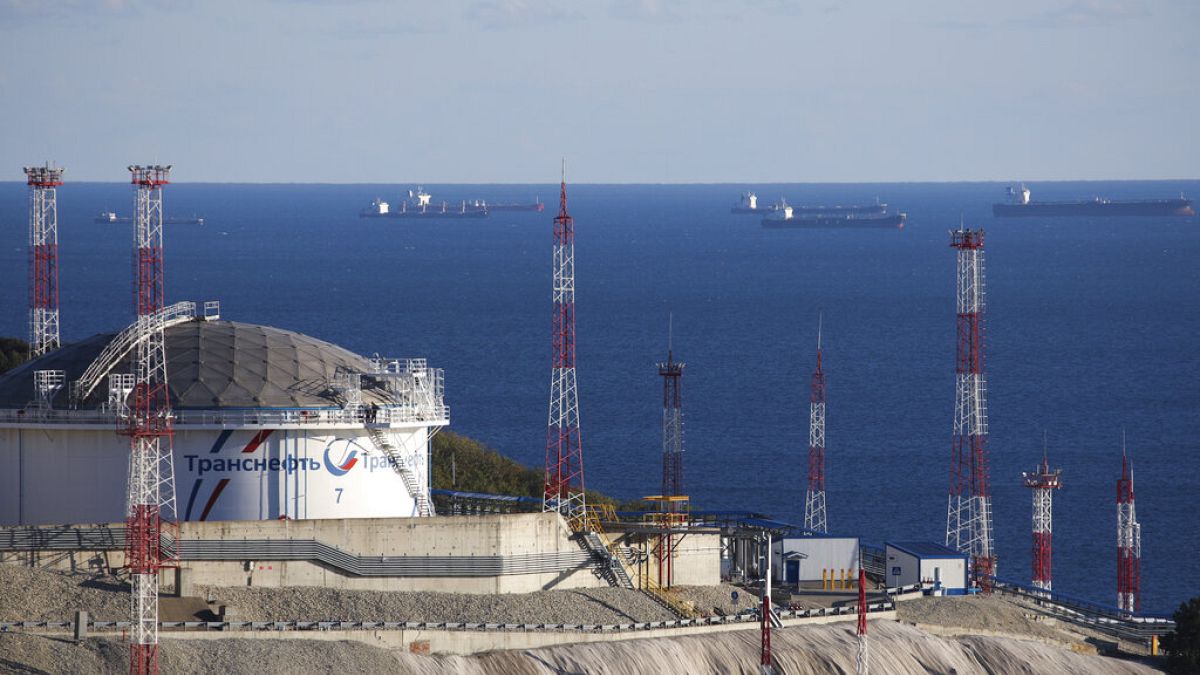The $60 (€56.9) price cap on Russian oil per barrel, also adopted by G7 countries and Australia, is seen as a key step as Western sanctions aim to starve President Vladimir Putin of funding for his war in Ukraine.
The European Union agreed to a $60-per-barrel (€56.9) price cap on Russian oil, a key step as Western sanctions aim to reorder the global oil market to prevent price spikes and starve President Vladimir Putin of funding for his war in Ukraine.
After a last-minute flurry of negotiations, the EU Presidency, held by the Czech Republic, said in a statement that “ambassadors have just reached an agreement on a price cap for Russian seaborne oil.”
The decision must still be officially approved with a written procedure but is expected to go through.
They needed to set the discounted price that other nations would pay by Monday when an EU embargo on Russian oil shipped by sea and a ban on insurance for those supplies take effect.
The price cap, which was also backed by the G7 countries and Australia, aims to prevent a sudden loss of Russian oil to the world that could lead to a new surge in energy prices and further fuel inflation.
The $60 figure sets the cap near the current price of Russia’s crude, which recently fell below $60 a barrel.
Some criticise that as not low enough to cut into one of Russia's main sources of income.
It is still a big discount to international benchmark Brent, which traded at about $87 (€82.5) per barrel Friday but could be high enough for Moscow to keep selling even while rejecting the idea of a cap.
Fuel prices hike risk
There is a big risk to the global oil market of losing large amounts of crude from the world’s second-biggest producer. It could drive up gasoline prices for drivers worldwide, which has stirred political turmoil for US President Joe Biden and leaders in other nations.
Europe is already mired in an energy crisis, with governments facing protests over the soaring cost of living while developing nations are even more vulnerable to shifts in energy costs.
But the West has faced increasing pressure to target one of Russia's main moneymakers — oil — to slash the funds flowing into Putin's war chest and hurt Russia's economy as the war in Ukraine drags into the ninth month.
The costs of oil and natural gas spiked after demand rebounded from the pandemic, and then the invasion of Ukraine unsettled energy markets, feeding Russia's coffers.
Now, more uncertainty is ahead. COVID-19 restrictions in China and a slowing global economy could mean less thirst for oil. That is what OPEC and allied oil-producing countries, including Russia, pointed to in cutting back oil supplies to the world in October.
That competes with the EU embargo that could take more supplies off the market, meaning an oil squeeze and higher prices. Russia exports roughly 5 million barrels of oil a day.
Russian oil heads East
Putin has said he would not sell oil under a price cap and would retaliate against nations that implement the measure. However, Russia has already rerouted much of its supply to India, China and other Asian countries at discounted prices because western customers have avoided it even before the EU embargo.
Most insurers are located in the EU or the United Kingdom and could be required to participate in the cap.
Russia also could sell oil off the books by using “dark fleet” tankers with obscure ownership. Oil could be transferred from one ship to another and mixed with oil of similar quality to disguise its origin.
Even under those circumstances, the cap would make it “more costly, time-consuming and cumbersome” for Russia to sell oil around the restrictions, said Maria Shagina, a sanctions expert at the International Institute for Strategic Studies in Berlin.
Watch Euronews' full report in the player above.
